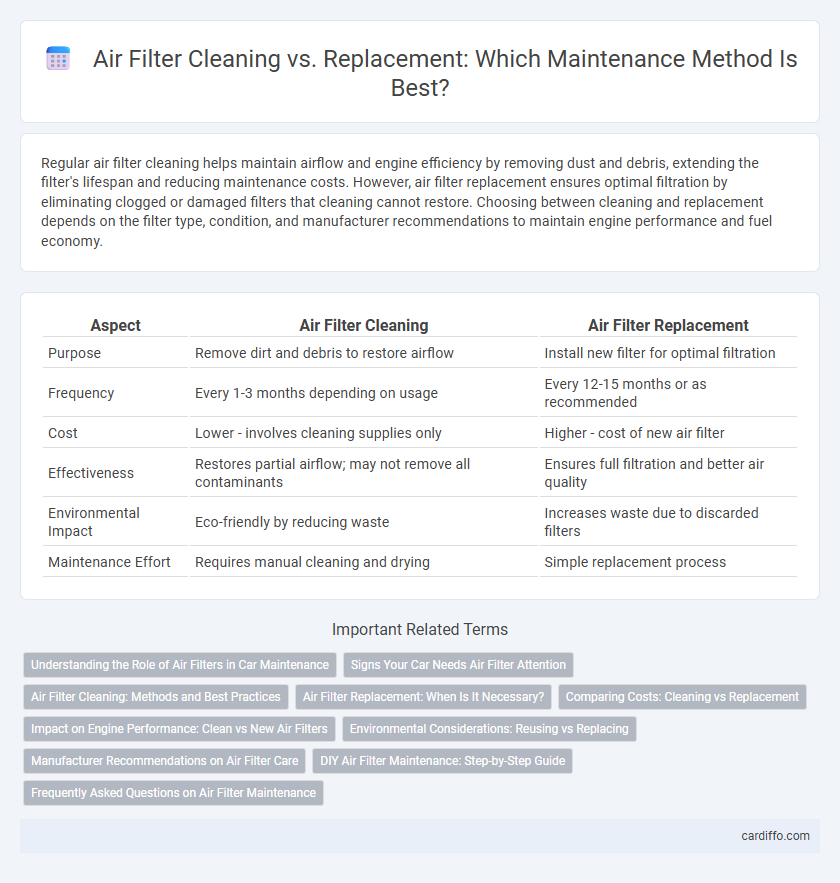Regular air filter cleaning helps maintain airflow and engine efficiency by removing dust and debris, extending the filter's lifespan and reducing maintenance costs. However, air filter replacement ensures optimal filtration by eliminating clogged or damaged filters that cleaning cannot restore. Choosing between cleaning and replacement depends on the filter type, condition, and manufacturer recommendations to maintain engine performance and fuel economy.
Table of Comparison
| Aspect | Air Filter Cleaning | Air Filter Replacement |
|---|---|---|
| Purpose | Remove dirt and debris to restore airflow | Install new filter for optimal filtration |
| Frequency | Every 1-3 months depending on usage | Every 12-15 months or as recommended |
| Cost | Lower - involves cleaning supplies only | Higher - cost of new air filter |
| Effectiveness | Restores partial airflow; may not remove all contaminants | Ensures full filtration and better air quality |
| Environmental Impact | Eco-friendly by reducing waste | Increases waste due to discarded filters |
| Maintenance Effort | Requires manual cleaning and drying | Simple replacement process |
Understanding the Role of Air Filters in Car Maintenance
Air filters play a critical role in car maintenance by trapping dust, dirt, and debris to ensure clean airflow to the engine, which optimizes performance and fuel efficiency. Regular air filter cleaning can extend filter life, but replacement is essential when clogging impairs airflow, leading to reduced engine power and increased emissions. Understanding the balance between cleaning and replacement helps maintain engine health and prevents costly repairs.
Signs Your Car Needs Air Filter Attention
A clogged air filter reduces engine performance, causing rough idling, decreased fuel efficiency, and unusual engine sounds, signaling the need for air filter attention. Visible dirt or debris on the filter surface and a noticeable drop in acceleration are clear signs that cleaning or replacement is necessary. Regular inspection every 12,000 to 15,000 miles helps prevent engine strain and ensures optimal airflow.
Air Filter Cleaning: Methods and Best Practices
Air filter cleaning methods include vacuuming, washing with water and mild detergent, and using compressed air to remove dust and debris effectively. Best practices involve inspecting the filter regularly, ensuring it is completely dry before reinstalling, and avoiding harsh chemicals that could damage filter fibers. Proper cleaning extends air filter life, maintains HVAC efficiency, and improves indoor air quality.
Air Filter Replacement: When Is It Necessary?
Air filter replacement becomes necessary when the filter is visibly clogged, damaged, or after reaching the manufacturer's recommended interval, typically every 12,000 to 15,000 miles for vehicles or annually for HVAC systems. Replacing the air filter ensures optimal airflow, improves engine performance, and enhances indoor air quality by preventing dust, allergens, and contaminants from circulating. Neglecting timely replacement can lead to reduced efficiency, increased energy consumption, and potential damage to the engine or HVAC components.
Comparing Costs: Cleaning vs Replacement
Air filter cleaning costs significantly less than air filter replacement, often requiring only basic tools and minimal supplies. Replacement filters vary in price depending on make and model, typically ranging from $15 to $50 or more, while cleaning usually incurs only the cost of cleaning materials or does not require extra expenditures if done with existing supplies. Cleaning extends the filter's lifespan and reduces immediate expenses, but replacement ensures optimal performance and long-term engine protection, influencing overall maintenance budget decisions.
Impact on Engine Performance: Clean vs New Air Filters
Regular air filter cleaning restores airflow efficiency, reducing engine strain and improving fuel combustion, which enhances engine performance. In contrast, new air filters guarantee optimal filtration by completely eliminating accumulated dirt and debris, resulting in peak engine power and longevity. Neglecting timely replacement or cleaning can cause reduced acceleration, higher emissions, and increased engine wear.
Environmental Considerations: Reusing vs Replacing
Reusing air filters through proper cleaning reduces waste and lowers environmental impact by minimizing landfill contributions. Replacement air filters, while ensuring optimal performance, generate more waste and consume additional resources for manufacturing and disposal. Prioritizing reusable filters supports sustainable maintenance practices by balancing equipment efficiency with ecological responsibility.
Manufacturer Recommendations on Air Filter Care
Manufacturers emphasize adhering strictly to specified air filter maintenance intervals to ensure optimal engine performance and fuel efficiency. While cleaning reusable air filters is cost-effective and environmentally friendly, replacement is recommended when filters show excessive dirt, damage, or after a set mileage, as outlined in vehicle manuals. Following manufacturer guidelines on air filter care minimizes engine wear and maintains emissions standards.
DIY Air Filter Maintenance: Step-by-Step Guide
DIY air filter maintenance enhances engine efficiency and prolongs filter lifespan by regularly cleaning or replacing it. Begin by removing the air filter from its housing, inspecting for dirt and damage, and deciding if cleaning with compressed air or mild soap and water suffices or if a replacement is necessary. Reinstall the filter securely to ensure optimal airflow and prevent contaminants from entering the engine, maintaining peak performance and fuel economy.
Frequently Asked Questions on Air Filter Maintenance
Air filter maintenance is essential for optimal HVAC system performance, with common questions revolving around whether to clean or replace the filters. Cleaning is suitable for reusable filters made of washable materials, but most air filters, especially disposable pleated types, require replacement to ensure efficient airflow and air quality. Frequency of maintenance varies by environment, typically every 1 to 3 months, depending on factors such as dust levels, pet presence, and air pollution.
Air Filter Cleaning vs Air Filter Replacement Infographic

 cardiffo.com
cardiffo.com